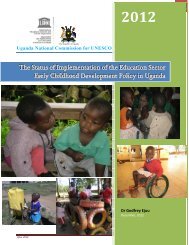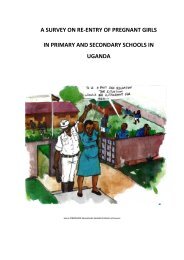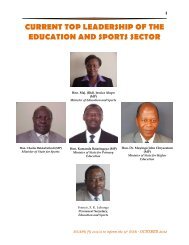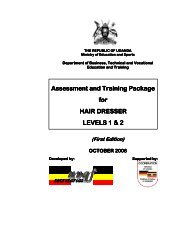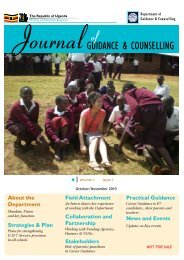Part I - Ministry Of Education and Sports
Part I - Ministry Of Education and Sports
Part I - Ministry Of Education and Sports
Create successful ePaper yourself
Turn your PDF publications into a flip-book with our unique Google optimized e-Paper software.
CHAPTER 4:EDUCATION AND SPORTS SECTOR<br />
PERFORMANCE DURING FY 2011/12<br />
4.1 ACCESS AND EQUITY<br />
The <strong>Education</strong> <strong>and</strong> <strong>Sports</strong> Sector is committed to enabling all Ug<strong>and</strong>ans to reach their educational <strong>and</strong><br />
employment potential. Access to learning allows individuals to take up work options that provide<br />
personal fulfillment, financial independence <strong>and</strong> enhanced community participation.<br />
4.1.1 Basic <strong>Education</strong><br />
Ug<strong>and</strong>a, as a signatory country to the UN Convention that established MDGs, is committed to<br />
achievement of universal access to equitable quality education by 2015. Every individual irrespective<br />
of race, gender, nationality, ethnicity or social origin, religion or political preference, age or disability,<br />
is entitled to access to equitable <strong>and</strong> successful completion of their education. For the Preprimary <strong>and</strong><br />
Primary education subsector, the goal of access is operationalized through policy objectives which<br />
constitute their annual work plans. The set objectives for FY2011/12 were to enhance the UPE<br />
programme; provide assistance to districts to improve the completion rate in primary education;<br />
enhance gender parity in primary education; <strong>and</strong>, enable children aged 612, especially girls, to access<br />
school at correct age, to complete quality primary education <strong>and</strong> achieve the required proficiency<br />
levels.<br />
a) Interventions undertaken during FY 2011/2012<br />
Basic education forms the basis for attaining basic literacy <strong>and</strong> numeracy skills, <strong>and</strong> consequently,<br />
reduces the dropout <strong>and</strong> repetition rates significantly <strong>and</strong> if well administered, will generate a<br />
fondness of the children towards learning <strong>and</strong> attending school. Therefore, the key interventions<br />
undertaken in the Basic <strong>Education</strong> subsector in FY 2011/12 to augment equitable access are indicated<br />
in Box 4.1 below;<br />
Box 4.1.Key interventions undertaken in the Basic <strong>Education</strong> subsector in FY 2011/12<br />
a) Implementation of the UPE Programme.<br />
b) Payment of PLE Fees.<br />
c) Payment of Capitation grants for preservice <strong>and</strong> inservice students in PTCs.<br />
d) Food distribution under the World Food Programme.<br />
e) Supply of Vegetable seeds, fruit trees <strong>and</strong> wood lot seedlings to schools under WFP.<br />
d) Facilitate children in Laroo School for War affected children.<br />
e) Construction <strong>and</strong> rehabilitation of primary schools.<br />
f) Licensing <strong>and</strong> registering of private primary schools.<br />
g)Grant aiding of community primary schools.<br />
b) Progress <strong>and</strong> main achievements<br />
(i) Implementation of the UPE Programme<br />
ESSAPR FY 2011/12 to inform the 19 th ESSR – OCTOBER 2012<br />
37



